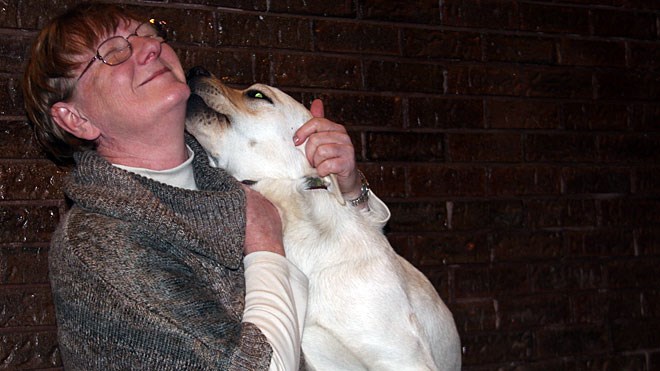As someone who lives with osteoarthritis, Carole Vanier has had service dogs for years to help her stand and sit, open doors and pick things up.
Thanks to a recent workshop co-ordinated by the Sudbury and District Kennel Club, Vanier's two-year-old border collie, Boss, is now also learning how to assist her with her Type 1 diabetes.
Debby Kay of Harpers Ferry, West Virginia — the owner of Debby Kay's Super Sniffer Workshops — was brought in Nov. 1-2 to teach members how to train their animals as sniffer dogs.
In Boss' case, he's learning to use his nose to detect when Vanier's blood sugar is low.
“I have hot flashes at night, and I can't tell the difference between the hot flashes and the low blood sugar, so I'm having to test quite frequently,” she said.
“Now, with training the dog, he can tell the difference between a hot flash and if my sugar's low. It means a lot less finger pricks, for sure, and the strips are expensive.”
She said her dog could even save her life if it means avoiding a dangerously low blood-sugar level.
Kay, who's been working in the field for 45 years, said sniffer dogs can be trained for a variety of purposes, including finding explosives, dead bodies, bed bugs and mould.
However, her current focus is training diabetes alert dogs.
“With Type 1 diabetics, when they've recorded on their meter that their blood glucose is down to a dangerously low level, we ask them to collect a saliva sample,” Kay said.
“They take that sample, put it into a special container, and we then preserve that sample and use it during the training of the dog.”
While some workshop participants were interested in training their animals as diabetes alert dogs, others just wanted to see what their dogs could do with their noses.
If the dogs become accomplished enough at scent detection, they can even participate in scent detection competitions.
“They can use their noses to find things that are hidden all over the place, so it's a lot of fun, and it's a good game for them as well,” Kay said.
Dogs love using their sensitive noses to work with people, she said.
“They realize people are very limited in their sense of smell,” Kay said. “The dogs kind of figure that out and think 'Well hey, I could do this for you. We can be the team. I can use the nose, and you tell me what it is that you want me to smell.'”
Longtime kennel club member Maureen Prosperi said the club has been exploring scent detection training for some time, and brought in Kay so members could learn more.
Even her 13-year-old dog, Georgia, caught on to the new skill pretty quickly, she said.
For more information about Kay's workshops, visit www.debbykay.com. Learn more about the Sudbury and District Kennel Club at www.sdkc.ca.
